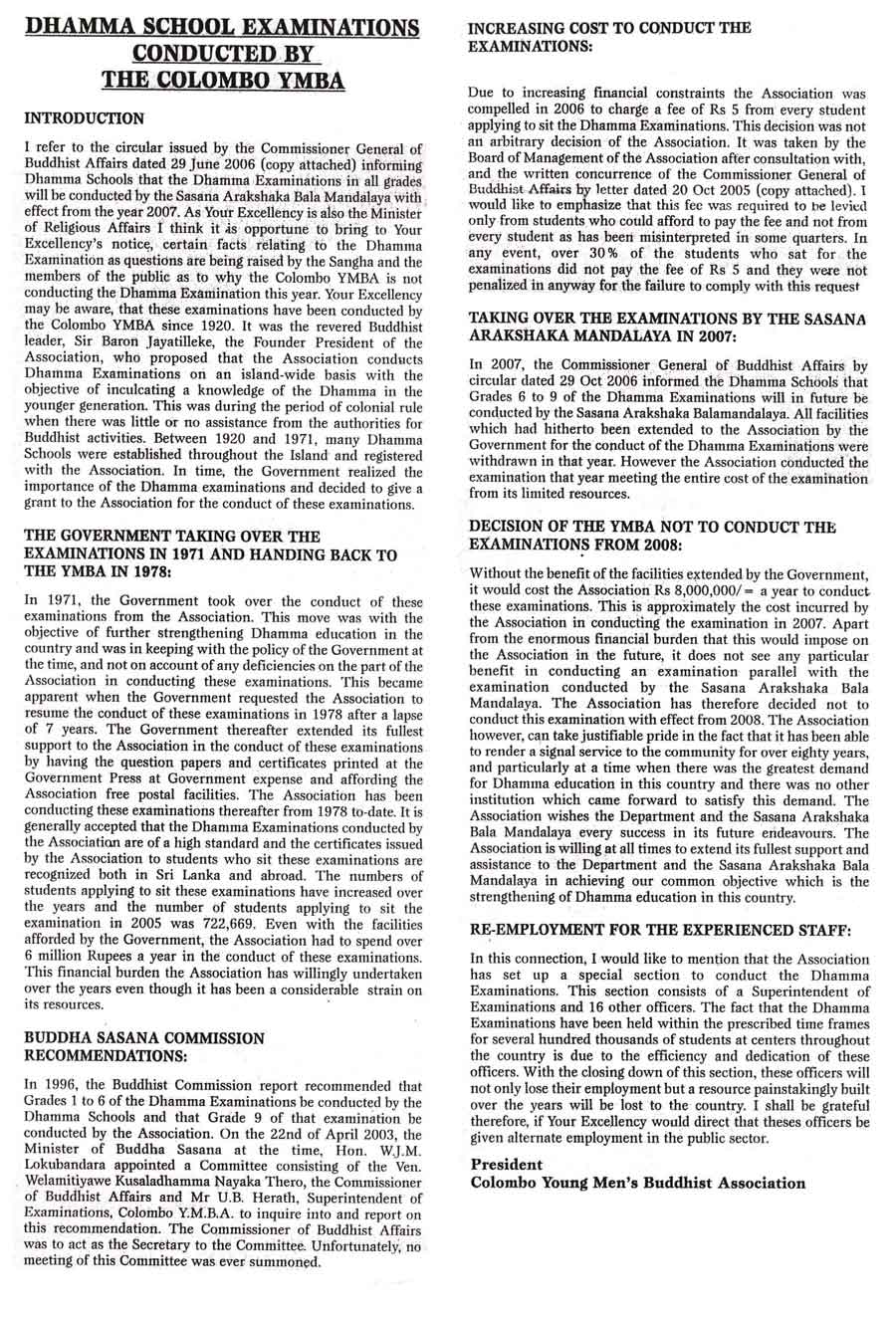The introduced in 1920 with 374 candidates from 27 schools by Sir DB Jayatilake was a project very close to his heart. He hoped that the children who studied and prepared to sit for the examinations would naturally follow the path of the Enlghtened One. It also helped to introduce uniformity and systematize the teaching of Buddhism in Dhamma Schools, which were registered in to the YMBA for the purpose students of the Dhamma Schools sitting the Dhamma Examinations.
Introduction of holding Dhamma Examinations in English medium in November 1948 is another remarkable milestone in the conduct of Dhamma examinations by the association.For the first time 356 candidates entered for the examination which conducted in eleven centres including one in Singapore.
In 1971 the Colombo YMBA was compelled to discontinue conduct of the Dhamma Examinations due to a decision by the Government' The Government grant of Rs' 50,000/- per year authorized by Mr. SWRD Bandaranaika in 1958 also was withdrawn and the Association was informed that the Ministry of Cultural Affairs would conduct the Dhamma Examinations at Senior and Teachers Levels'
It was the demise of one of the YMBA’s proudest achievement of 50 years, carefully monitored by a band of devoted volunteers which included Bhikkus who compiled books, prepared question papers and corrected the answer scripts free of charge.
In 1977 the government realized that the conduct of the Dhamma Examination by the Department of Education Examination was a failure recently drastic drop of candidates sitting the examination and the standard of the examination and the conduct of examinations was given back to the YMBA with a grant of Rs' 250,000/- for printing books which was subsequently given back to the Cultural Affairs Department' The grant to conduct the examination was also cut down to Rs' 25,000/- a year' The Association was asked to conduct the examinations from grade five to grade nine'
The association continued to conduct the examinations with great difficulty with assistance of affiliated YMBA’s, Sasanaraksaka Mandalayas with their voluntary services by 1996'the number of candidates increased to 400,000
The YMBA increased the number of examinations. Pali, Dhamma and Abhidhamma examinations for adults, Bhikkhus and laymen at preliminary, intermediate and final grades were also added to English medium examination for local students and candidates from Singapore, Malaysia, USA and Australia also was held'
From 1996 onwards the number of candidates sitting for the Dhamma Examinations rapidly increased annually. Along with the increase new Dhamma schools were established and registered with the YMBA mainly to facilitate candidates to sit the examinations. Whilst directly benefitting the candidates, this exercise indirectly spread the noble teaching of the Buddha among the younger generation as expected by its inaugurator late Sir Baron Jayatilaka, fulfilling his dream. By 2005, 11,167 Dhamma schools registered with the YMBA presented 722,669 candidates who sat the examination at 7250 centres in the country .This is the highest number of candidates sat for any examination conducted in Sri Lanka that year. This was possible due to the efforts of an efficient fully fledged staff of the Examination Branch supported by 45,000 dedicated volunteers, clergy and layman, who helped in setting up question papers,conducting the examination in the examination centres, collecting and dispatching question papers ,and correcting answering scripts. Magnanimity of this noble work was too much for some parties with vested interests to bear up and with their interference and influence the government again decided to hand over the conduct of Dhamma examinations to the Sasasanrakhsaka Bala Mndalayas and the Department of Commissioner of Buddhis Affairs. Getting ready to this end they got the government to withraow the facilities provided to the YMBA but Stopping the government grant for printing question papers and withdrawal of the free postal facilities that compelled the YMBA to face financial hardship. The appeals made to authorities fell on deaf ears and Sasanarakshaka Mandalayas and the Commissioner of Buddhst affairs with the full financial backing took over the conduct of examination from 2007. The YMBA was compelled to retire some employees with due benefits and transfer the Examinations branch staff to other branches.
An extract of a brief appeal made to the Head of the State published in the Daily News paper on 15.03.2008 given below will further, throw light under what circumstances the Dhamma examinations were taken over by the Sasanaraksaka Mandalayas.
